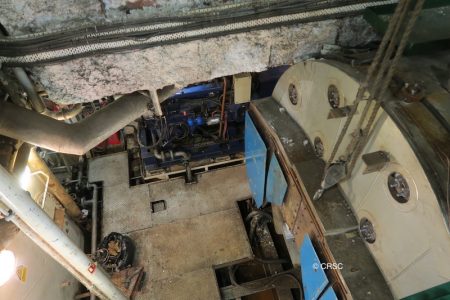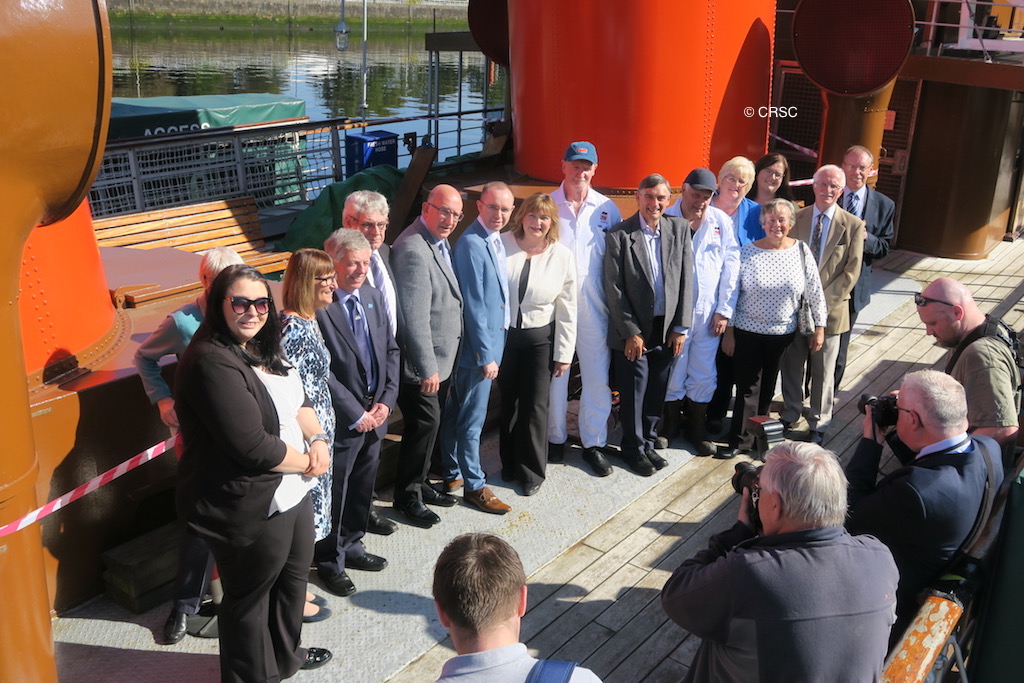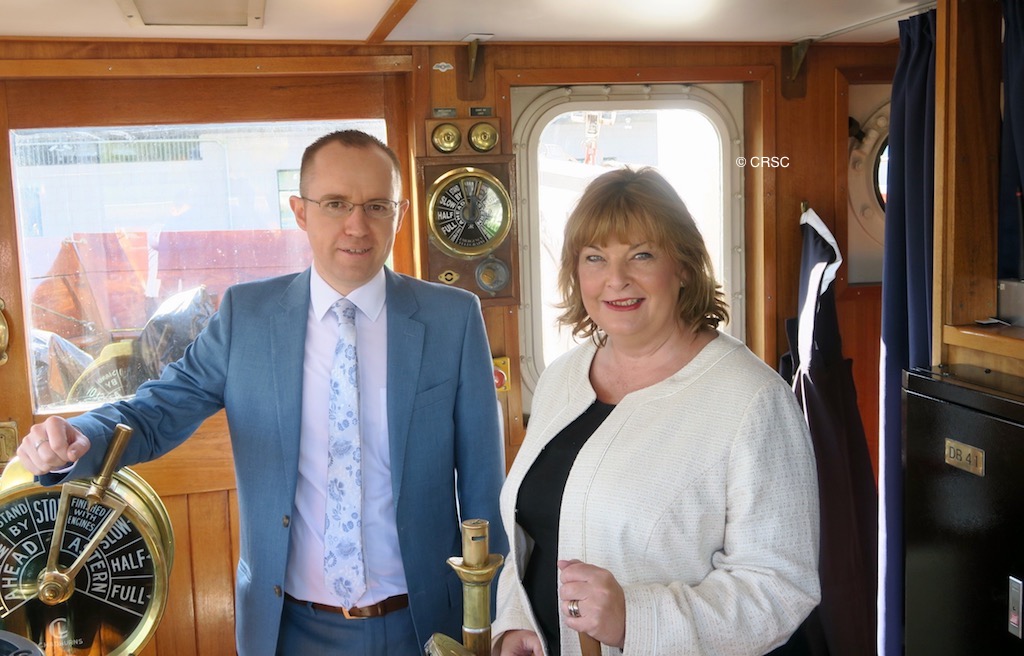
‘The people’s paddle steamer’: Waverley Excursions Ltd’s general manager Paul Semple welcomes Culture Minister Fiona Hyslop onto the bridge of Waverley shortly before her announcement of the Scottish Government’s £1m donation to the Boiler Refit Appeal
Waverley’s future is secure — thanks to a £1m cash boost from the Scottish Government. The gift was announced on Friday by Fiona Hyslop, Cabinet Secretary for Culture, Tourism and External Affairs. Speaking on the paddler’s open deck, she described Waverley as “the people’s paddle steamer”, a reference not just to the ship’s popularity around the British coastline, but to the swell of public support she has received from near and far since the Boiler Refit Appeal was launched. “We’re right behind you,” Ms Hyslop said. “Good luck with your fundraising” — a reference to the fact that £400,000 is still needed.
Andrew Clark reports on the background to Ms Hyslop’s announcement, and talks to Paul Semple about the challenges remaining before Waverley can return to service.
It is the ‘game changer’ every contributor to the Waverley Boiler Refit Appeal was hoping for — a £1m donation from the Scottish Government. That massive injection lifts the fundraising campaign within sight of its £2.3m target and virtually guarantees that, barring unforeseen disaster, the world’s last sea-going paddle steamer will indeed go to sea next summer.
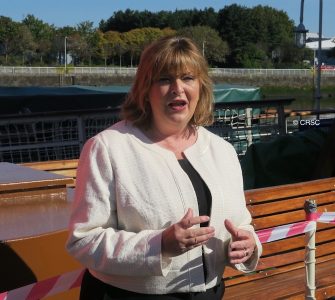
‘We’re right behind you’: during her speech on board Waverley, Fiona Hyslop said it was important that the paddler should be sailing during the Scottish Government’s Year of Coasts and Waters in 2020. Born and brought up in Ayrshire, Ms Hyslop recalled that she had held her 21st birthday party on board Waverley
Having collected a phenomenal £900,000 in individual donations since the launch of the appeal just three months ago, the directors of Waverley Steam Navigation Company Ltd (WSN), the charity that owns the ship, were hoping the tide of sentiment would continue its surge, carrying the appeal to the finishing line. But time was of the essence: Waverley’s management needed a guarantee of funding by early January if the four-month programme for replacing the boilers was to proceed in time for the 2020 season. What they needed was a ‘game changer’.
The first sign that the powers-that-be might be casting a benign look in the direction of our beloved paddler came within days of the 10 May announcement that her entire 2019 season had been cancelled: Jackie Baillie, MSP for Dumbarton, mentioned Waverley’s plight in parliament at Holyrood. Then, at First Minister’s questions on 20 June, Neil Bibby, MSP for West Scotland, requested government support for the boiler appeal, prompting Nicola Sturgeon to speak of Waverley as “a tremendous asset and a great national treasure”.
Things were looking up — and confidence grew in early July when Alasdair Allan MSP, a former Waverley shopkeeper, visited the ship at her Science Centre berth in Glasgow. Shortly after this, the first formal contacts between WSN and civil servants took place, leading to WSN submitting an application for funding on 23 August.
This laid out the ‘business case’ for returning Waverley to service: it highlighted the action taken so far, explained what still had to be done and provided a full budget and costings for boiler replacement. On 3 September the Government published Protecting Scotland’s Future, its legislative programme for the coming year: Waverley received no fewer than three mentions. Here was the first indication not just that the Government had agreed in principle to commit itself to the campaign, but that it was politically safe to do so.
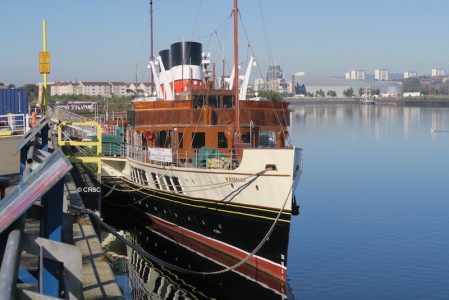
Waverley at her Science Centre berth on Friday, the day the Scottish Government’s £1m gift was announced
In retrospect Friday’s announcement may seem a foregone conclusion — as if it had never been a question of “if” the Scottish Government would chip in, merely “when”. But for the team running the appeal from Waverley’s Lancefield Quay headquarters, nothing could be taken for granted. Before Holyrood could be brought ‘on board’, masses of preparatory work had to be completed in order to underline the credibility of the campaign. Warm ‘noises’ over the summer were all very well, but it is only now, with confirmation of the £1m gift, that we can celebrate — and let out a huge sigh of relief. WSN’s patient, professional, unpressurised wooing of the Government has paid off.
There is still money to be sought — the appeal remains £400,000 short of its target — but with government backing, Waverley has won an official stamp of approval that will encourage corporations and trusts to contribute: applications have been made to 38 of these, with more to follow. WSN is also hoping that its application for £250,000 from the National Lottery Heritage Fund will come good in November. For the time being, the appeal continues, and yes, your contribution is needed right up to the moment the last penny is in the bank.
The success of the appeal has confounded the naysayers who said the repair timetable was over-ambitious, that the financial target was beyond reach, that — after so many crises in her 72-year history — this was the one Waverley might not survive. Well, the old girl may not have carried a single passenger in the past 11 months, but she attracted £½m of individual contributions in the six weeks after the appeal was launched. We should never underestimate the place this ageing relic of the steam age has carved in our hearts.
Dare we hope she will reach her centenary? What the Scottish Government’s donation guarantees is that a whole new generation— people of different ages, backgrounds, creeds and social status — will now be seduced by the sound of Waverley’s paddles, the sight of her engines, the powerful message she proclaims about our maritime and industrial heritage. Waverley is a ‘living thing’, the darling not just of nutters but of the nation.
- ● ● ● ●
Recalling the day last week when he learnt of the Scottish Government’s £1m donation, Paul Semple admits it took 24 hours for the information to sink in. On taking up the post of general manager on 18 February, his immediate priority was to plan a timetable for the 2019 season. Little did he realise that his new job, for which he sacrificed a high-flying career in education, would turn out to be that of chief fundraiser.
When it became clear that Waverley’s boilers were beyond repair, the news came as a shock. Renowned as Paul, 40, may be for his cool in a crisis, for his media savvy and long experience of Waverley as steward and purser, the challenge of leading a ‘do or die’ campaign to keep the ship in service was daunting. That was when his renowned ‘can do’ attitude really kicked in. “I’ve always thought Waverley has such a personality that ‘she’ll do it’,” he says, gazing out across the River Clyde from his WSN office at Lancefield Quay. “Once donations to the appeal started coming in, we realised we could show the Government how much Waverley meant to the individuals and communities she serves.”
The ‘proof’ lay not just in the independent economic impact assessment WSN had commissioned in 2015, revealing that the paddler’s contribution to the Scottish economy was £3.6m (plus £2m more to the rest of the UK). No, it lay just as much in the fundraising events that took place spontaneously up and down the coastline — from trips organised by Plockton Sea Cruises on Loch Carron and Poole City Cruises on the south coast, to four-year old Ethan Pringle’s ‘Round Cumbrae Push’ and the Waverley Inn’s fundraiser on the Isle of Wight.
Events at Dunoon, Rothesay and above all Tighnabruaich — where the Pier Association contributed an astonishing £6,700 early in the campaign — underlined that Clyde coast communities do recognise Waverley’s value to their wellbeing. CRSC chipped in £6,000, Lochs & Glens Holidays another £5,000. Up to this week, the biggest single donor was the Paddle Steamer Preservation Society, which not only paid for last winter’s refit, crucially guaranteeing Waverley’s future as a going concern, but more recently added £157,000 from its reserves. Paul says PSPS support was “absolutely essential”.
Contributions from England and Wales have increased in the past three weeks, many of them in response to a WSN mail-out to the 60,000 people on its customer database (a third of them living south of the border): this was cannily timed to coincide with the end of August when everyone would normally have been expecting Waverley to end her Clyde season and begin visits to North Wales, the Bristol Channel, the south coast and the Thames.
On the Monday after that mail-out was despatched, a single postal delivery brought in more than 260 cheques, worth £19,500.
“On another day,” Paul recalls, “an envelope came in with a £10 note and a postit note — no name — with the words ‘Good luck’. In the same delivery there was a £10,000 cheque. That illustrates the breadth of Waverley’s appeal.”
Instead of publishing a rolling tally of money raised, as some enthusiasts wanted, Paul calculated that the appeal would make more impact if he disclosed the total at significant milestones — a tactic that seems to have worked. “We needed to keep the appeal fresh,” he says, “but it has been very much ‘learn as you go’.”
The appeal has forced WSN to change its modus operandi — from ship operation to fundraising campaign — and reduce its payroll. The skeleton full-time staff now comprises three fundraisers, including Paul, and on the technical side, Project Manager Alasdair Macmillan.
With boilers, generators and electrical switchboard already ordered, attention is turning to the logistics of the replacement programme. Waverley will need to be moved to a shipyard in January. Paul remains tight-lipped about where the contract will be placed, but says that, in common with the re-boilerings of 1981 and 2000, the ship will remain afloat for most of the four months of refit, due to the stresses it imposes on the hull.
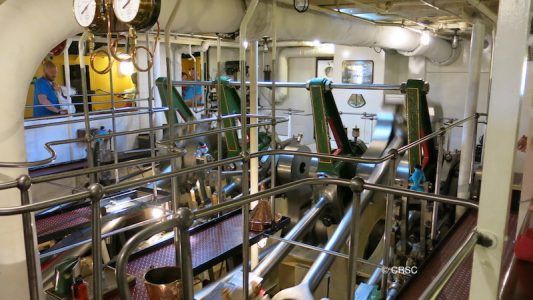
Seeing the engines: Waverley’s powerful cranks, mounted diagonally and powered by steam from the boilers, are a vivid reminder of Britain’s industrial heritage. The chance to see the ship’s engines is one of the major attractions of a trip on Waverley — the working mechanism is like an exhibition piece
A section of the ‘fiddley deck’ (the steel decking around the funnels) has already been cut to allow the forced draught fans and air ducting to be sent to Cochran, the Dumfriesshire boilermaker, for full refurbishment and fitting to the new boilers. Parts of the boiler room are already being stripped down in order to get all preparatory work done by December.
Meanwhile, two qualified chief engineers, working part time alongside experienced volunteers, are overhauling items that are subject to regulatory survey on an annual or five-yearly basis. “We are keeping the Maritime and Coastguard Agency informed,” says Paul, with an eye to renewing Waverley’s passenger certificate in time for next summer. “We know from the 2018-19 overhaul that the hull is in excellent condition and the paddle wheels have been refurbished. The previous year, we carried out work on the steering mechanism and renewed the rudder stock, so we know that other major parts of the ship are in good order.”
Asked what personal toll the events of the past nine months have taken on him, Paul smiles, venturing that “due to the speed at which things have happened, I haven’t had time to reflect on it. I had to adapt quickly, finding new skills and adapting skills I already had through teaching — ‘people skills’, personal skills, clear communication. I try to focus on solutions rather than problems.”
Those skills were well used when WSN announced the cancellation of the 2019 season. Paul’s post on Waverley Excursions’ Facebook page had 1m hits, “and immediately the donations started flowing. At 6pm that night I was on the BBC and STV news. I had no time to prepare — I knew the key points but had to think quickly. There’s a job to be done — with Waverley there is always something needing done — but I hold in my mind the vision of Waverley sailing again with a crowd of passengers on board. That’s my goal.
“I remember, as a boy, seeing her for the first time. It was at Largs — she swept round the point and into the bay as if to say ‘I’m here’. Well, that’s where I’m hoping to be on her first day back in service. But to get there, we still need to raise the final £400,000.”
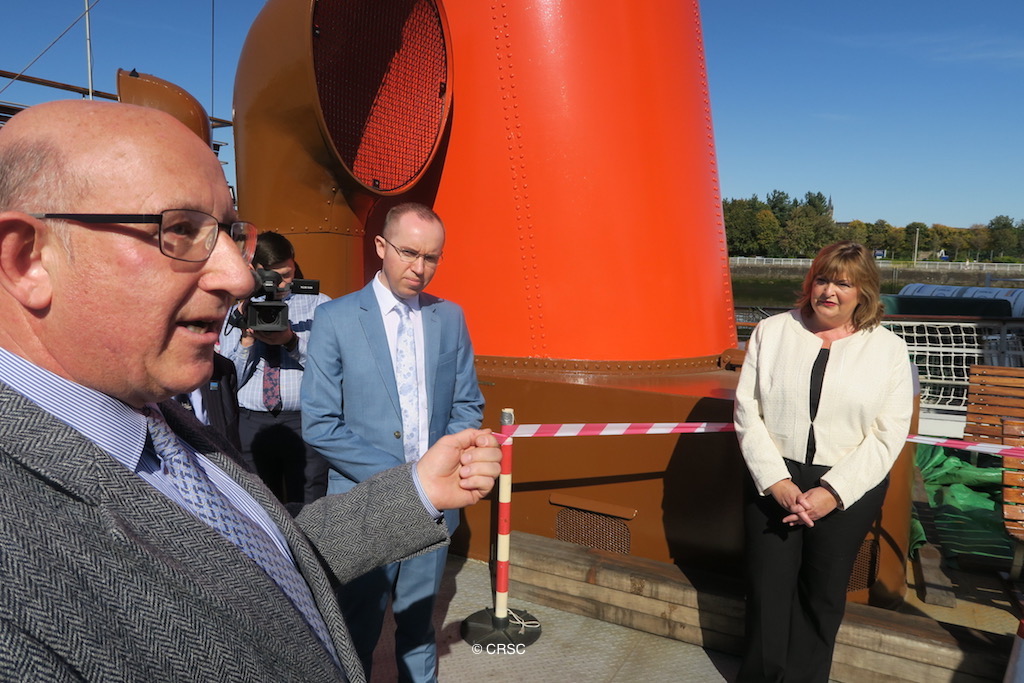
Waverley Excursions Ltd’s chairman Cameron Marshall (left) replies to Fiona Hyslop’s speech, with Paul Semple looking on. Describing Waverley as ‘a jewel in Scotland’s story’, Cameron saluted the Government’s ‘far-sighted’ donation and thanked it for such ‘fantastic’ support
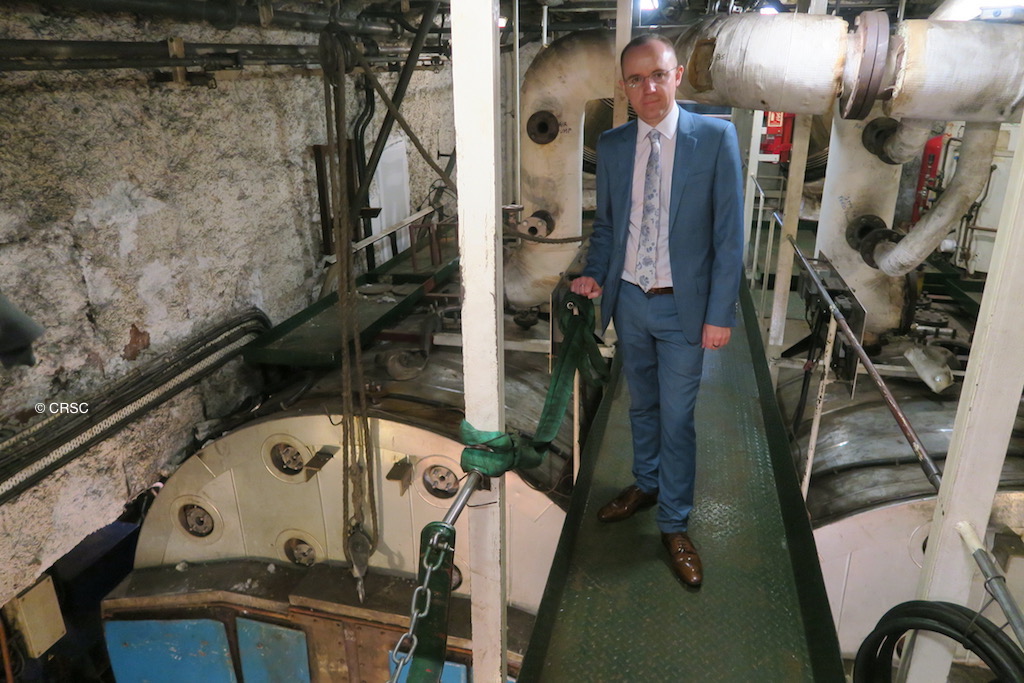
Paul Semple on the gangway above Waverley’s 20-year old Cochran boilers, which will make way for a new pair
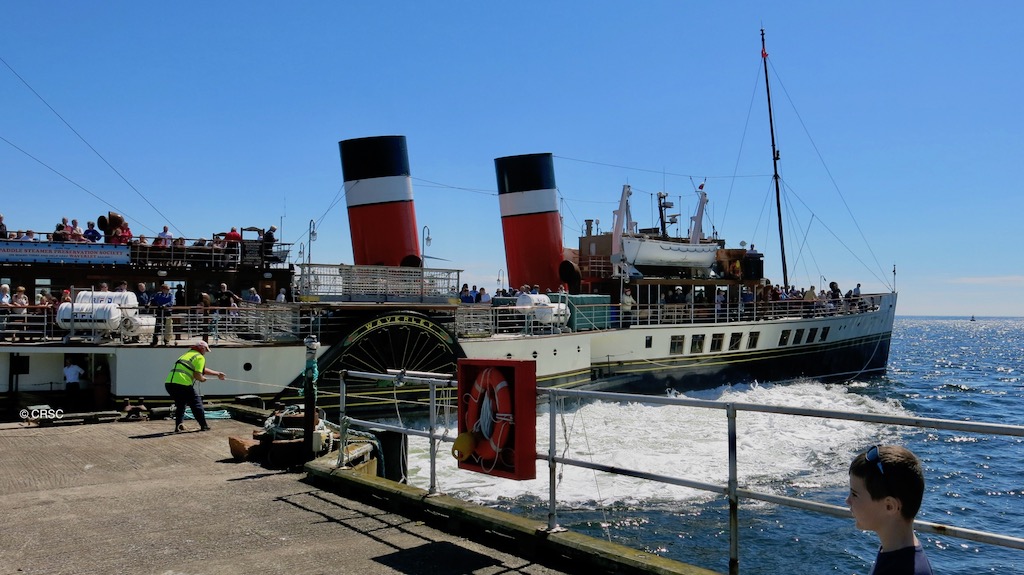
A gift to a new generation: Waverley as we want to see her — thrilling countless people of all ages and backgrounds around our coasts
Further reading:
‘We’re determined to see Waverley sail again’
Waverley cancels 2019 season and launches appeal
CRSC’s £6k boost to Waverley appeal
Published on 21 September 2019













